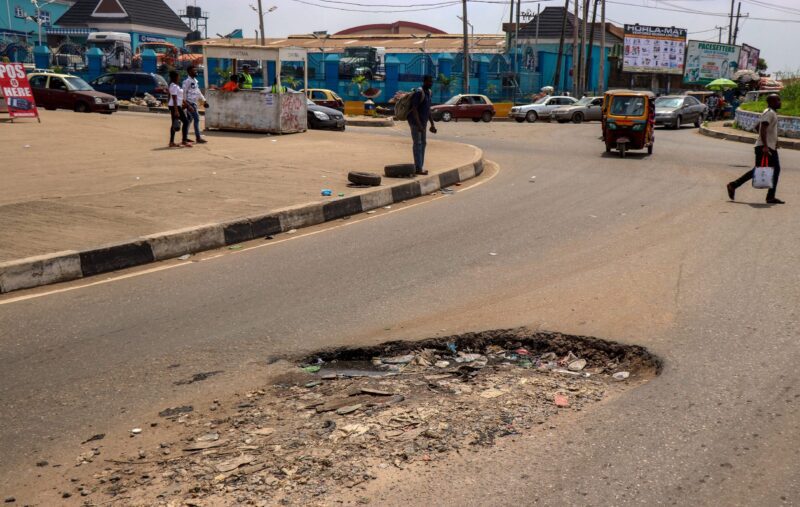National Issues
The Terrifying Conditions of Nigerian Roads: A Threat To Human Endeavors -By Useh Faith Emeakpor
In the industrial sector, however, good roads are required to close the gap between the place of production and final consumption. There’s research showing that there’s a strong connection between road transportation and economic growth in Nigeria.

It is no news that Nigerian roads are generally in a bad state. Either they are left abandoned halfway, deteriorating, or left to become progressively worse than their initial state due to a lack of maintenance.
While Nigeria boasts of having the largest road network in Africa, only about 60,000 km are paved, from the total estimate of 195,000 km. Surprise for the supposed giant of Africa.
To bring us home, and very close to the one I know very well, is the major road in Abraka, Delta State. It is not what I can finish talking about in a hurry. To cut it all short, I can tell you for free that the major road connecting Abraka to Obiaroko, on one axis and Warri on the other, is nothing to write home about.
Anyone prepared to pass through the police station junction, especially on a bike, must first say their last prayers before passing through it. It is one of many bad spots in this area.
Most roads constructed by the Nigerian Government/or corporate individuals in the late 80s and 90s are already deteriorating due to poor maintenance amid the poor construction.
Newly constructed roads take no time to deface due to the low-budget materials used during construction.
Despite the heavy budget allocated annually to infrastructural development projects, much is yet to be seen on how the conditions of our roads justify their fiscal allocations.
Regardless of the beauty and aesthetics good roads add to every city and Nation, our government pays little to no attention.Instead, they change cars almost every year.
The Federal Road Safety Corps (FRSC) estimated 3.7 deaths per 100,000 population in Nigeria in 2009. But in contrast, a population-based study in the same country reported a higher estimate of 160 deaths per 100,000 population.
Every year, the FRSC releases an answerable number of deaths. Although, many of the deaths and thousands rendered handicapped due to bad roads never make it to the record.
The state of bad roads in Africa causes death rates to increase each year. According to the 2015 Global Status Report on Road Safety, the World Health Organization (WHO), the African region, had the highest fatality rates from road traffic injuries worldwide. At 26.6 per 100,000 population for the year 2013.
Most deaths and injuries from road accidents mainly spring from bad roads in the country and Africa.
In 2013, over 85% of deaths and 90% of disability-adjusted life years (DALYs) lost from road traffic injuries occurred in low- and middle-income countries – with only 47% of world-registered vehicles.
The increased burden from road traffic injuries and deaths is partly due to economic development, leading to vehicle increases on our roads.
According to statistics, Nigeria ranks first in Africa with the worst, unmotorable road networks, capping it with the highest number of accidents and deaths. Yet, our government turns a blind eye to it.
The tanker-related accident claiming lives and property each day, especially along the Lagos-Ibadan expressway, Abuja-Kogi, and others, are all linked to issues of bad roads.
Practically every Nigerian and every sector of the Nigerian economy relies on one form of transportation or the other, with the road being the most utilized means.
Therefore, a good road network where commuters arrive at their destination without bad road-related delays is crucial. Apart from ensuring the safety of lives, a seamless transfer of goods to foster economic progress is assured.
No doubt good road aids the flexibility and mobility of the workforce from one end to the other. It also lowers production costs and raises productivity, especially in the agriculture sector.
In this sector, the transportation of products from the farm to consumers as an important factor in the production chain cannot be overemphasized.
In the industrial sector, however, good roads are required to close the gap between the place of production and final consumption. There’s research showing that there’s a strong connection between road transportation and economic growth in Nigeria.
Good roads contribute to the well-being of citizens in Nigeria.
Road transportation contributes to GDP (Gross Domestic Production) in any country, consequently impacting economic growth where goods and services can reach the end users.
Additionally, other means of transportation such as water, rails, and airways should be looked into, thus, reducing the burdens on our roads.
In conclusion, more efforts to ensure good roads in Nigeria should be encouraged. The reasons are obvious and stated above.
Our maintenance culture needs to be improved to avoid the progressive deterioration of the few good roads.









